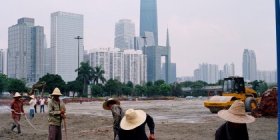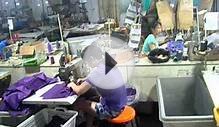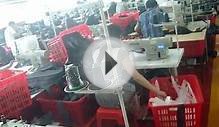
 In Guangzhou the arrival of transnational migrant entrepreneurs from countries across Africa has captured the attention of a growing number of scholars, artists, and documentary film makers. Their works have described in rich detail the complexities of these migrants’ experiences as they labor to establish their work and family lives in the post-socialist nation.
In Guangzhou the arrival of transnational migrant entrepreneurs from countries across Africa has captured the attention of a growing number of scholars, artists, and documentary film makers. Their works have described in rich detail the complexities of these migrants’ experiences as they labor to establish their work and family lives in the post-socialist nation.
While most studies have focused on the broader socio-economic ramifications of African migrants’ activities in China, few works have analyzed how the structural dynamics of transnational outsourcing of labor and manufacturing capacities shape the everyday encounters between African migrant entrepreneurs and Chinese manufacturers. Labor subcontracting based on low-volume production and short-term contracts among non-elite, migrant entrepreneurs (that is, both domestic and foreign migrants) demand consideration, since the precarious conditions of business and work for all participating parties in an economic transaction throw into sharp relief the question of who ultimately dictates the terms of labor and exchange.
In the low-cost garment industry in Guangzhou, where I conducted my dissertation fieldwork from 2010-2012, the volatility of short-term contracts compels independent contractors, brokers, and small-scale manufacturers to come together to negotiate the terms of collaboration and exchange. In the city’s garment district, clusters of small assembly workshops predominantly owned and operated by Chinese migrants from the countryside serve the world’s commodity chains for fast fashion. There, the production processes of garment mass manufacture are segmented such that assembly workshops serve only one node along the larger transnational commodity chain.
These fragmented processes include dyeing fabric, printing images on t-shirts, and embroidering logos onto t-shirts. Because of the fragmentation of these production processes, clients must supply their own fabrics and accessories before quickly delivering them to manufacturers. They rely on their manufacturers to ensure quality of garments and speed of production at low costs in order to catch up with the speedy turnover of fashion trends. At the same time, Chinese manufacturers depend on a steady stream of production orders from their clients in order to sustain their small-scale businesses.
Because of the quickly changing conditions of sub-contract labor, Chinese manufacturers and their transnational clients must mutually negotiate the terms of collaboration and exchange. Industry demands for quality and speed of delivery at low-costs along the commodity chains for cheap garments require participants in an economic transaction to constantly re-negotiate with one another in light of highly variable circumstances, which include the fluctuating costs of fabric and raw materials, as well as the changing cycles of fashion trends. Specifically, these industry-wide instabilities affect garment quality and price, two aspects of garment production that are often highly contested among negotiating parties.
INTERESTING VIDEO












